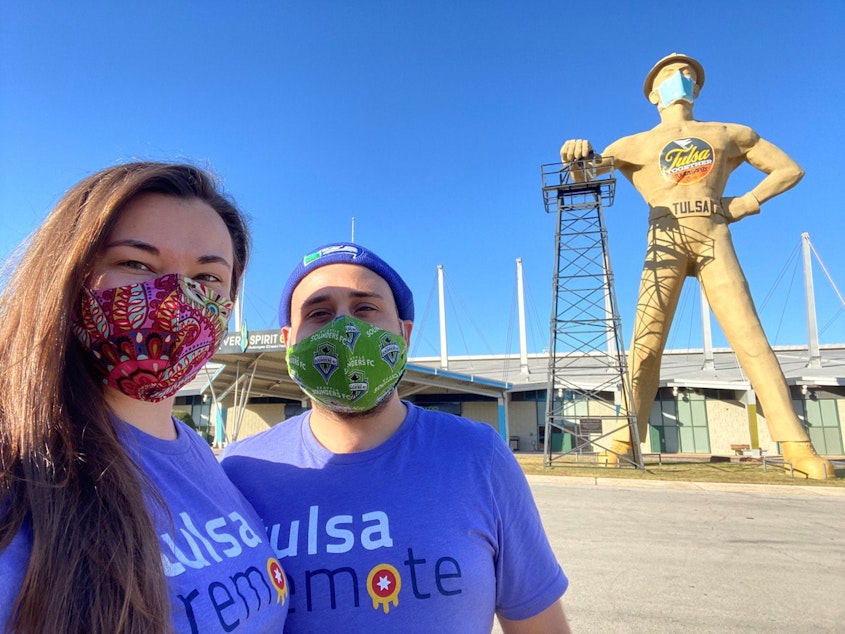The great pandemic migration wasn't as expected as Seattle continues to attract newcomers

The pandemic has changed so many things about the way people work. Tech workers, in particular, have discovered they can do their jobs from anywhere.
Small towns are trying to attract tech talent away from cities like Seattle. But that hasn't resulted in the "great migration" some people expected.
Tiago Duarte used to live in the Tri-cities area of Washington. He had a tech job with a financial company there, but his dream was to move to Seattle and buy a home.
At some point, he realized that would probably never happen.
“A home just never seemed like it would be within a reasonable price for me," he said. "Sure, we would gain everything that comes from living in Seattle. And trust me, as a die-hard Sounders fan, it still pains me a little bit to not be able to march down Occidental to the stadium ... but, at what cost, right? And it just never seems like the cost was worth it. I almost feel like I was 15 years too late to Seattle.”
Then, last year, he saw a tweet about a program in Tulsa, Oklahoma. It was recruiting people who have tech jobs in cities like Seattle. People whose jobs can be done remotely.
The pitch is that if you can do your work from anywhere, why not do it from a place like Tulsa, where the average home costs $137,000?
Sponsored
There’s kind of a gold rush, in a few cities around that size, to attract these workers. And because destinations like Tulsa aren’t exactly on the top of everybody’s list, these programs sweeten the pot by giving participants $10,000 in cash and access to a co-working space.
The program in Arkansas even throws in a free bike.
Duarte and his fiancé Teddie Mucha applied for the Tulsa program. Applications are competitive, and when they were finally accepted, they talked about it like they’d won a big contest.
They’ve been living in Tulsa for three months now, and they’re thinking about starting a family in their new city.
“Who am I to scoff at moving to Oklahoma, right?" Duarte asked. "The dream of owning a home is actually real here in Tulsa. It doesn’t have to be a forever home. But it at least gives us a new chapter. It gives us a new place to explore.”
Sponsored
Organizers of Tulsa Remote say applications to their program have increased by a factor of three, during the pandemic. The program has around 450 participants now. Arkansas, Alabama and Savanna, Georgia also offer incentives for remote workers from cities like Seattle to relocate there, and as new programs emerge, they cite Tulsa's success.
Seattle is still drawing them in
But even with these programs growing, they’re not making a dent in Seattle’s population.
Eily Cummings ran the numbers. She's the director of communications for United Van Lines, which she described as the biggest moving company in the U.S.
Cummings dug into her company’s numbers to see who is moving where and why. She said while the pandemic has decreased the number of people moving overall, there are still three people moving to Seattle for every two people that leave.
Sponsored
“You have the water and the climate and the mountains," Cummings explained.
Sponsored
Attractions like that have helped make Seattle the number 2 destination in the U.S. right now.
“We’re moving more people into Seattle than any other large city but Washington D.C.,” Cummings said.
And the neighborhoods people are moving to in the Seattle metro area are the region’s densest places: Belltown, Queen Anne, and the neighborhood around Amazon’s headquarters. Outside of Seattle, they're flocking to Bellevue and Redmond.
People moving to Seattle from New York like that homes are cheaper here than in Manhattan. Sure, Seattle is expensive compared to how it used to be — but the cost of living is relative.
Nearly a quarter of the region’s new arrivals come from California.
Sponsored
“When we look at moves from the state of California, a lot of people are moving for a lifestyle change — you could draw some correlations to cost of living," Cummings said. "Also, some of the climate change issues, maybe with the fires and a lot of stuff might lead to that, especially in northern California.”
During the first six months of the pandemic, as people discovered that they can work from anywhere, many experts predicted a “great migration” away from American cities.
The big surprise here is that, when given that choice, people are still packing their furniture into moving vans and heading to Seattle.

